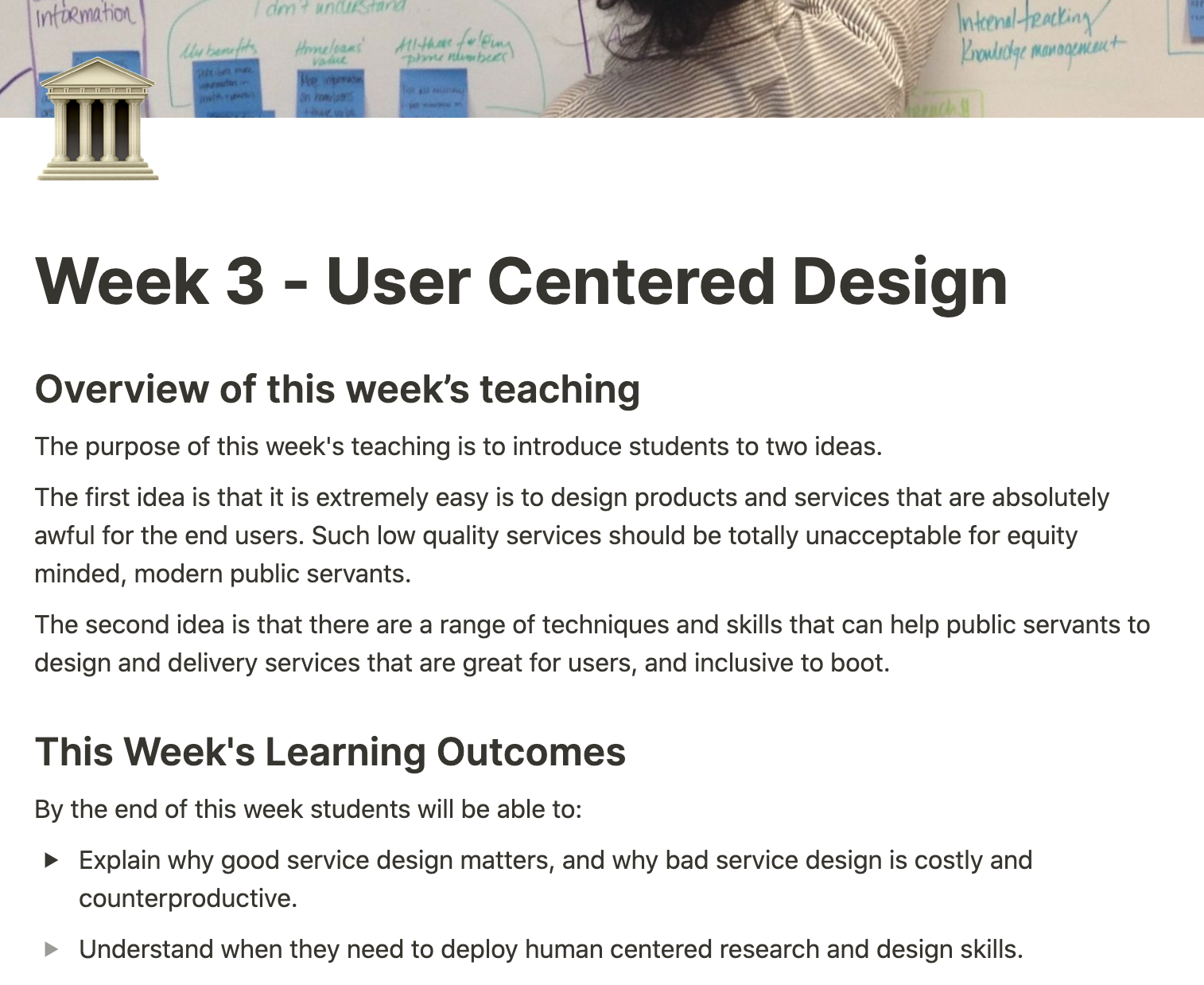Week notes #1
Prior to our launch this project was, to a certain extent, operating in ‘stealth mode’. We’re now very much ‘out there’, but the habit of not sharing much can be hard to break. So I’m going to have a go at writing weeknotes for people who are interested in following developments at ‘Teaching Public Service in the Digital Age’ in a manner that is both a bit more granular, and a bit more informal than the Newsletter.
By far the most time-consuming thing going on at the moment is that we’re developing our open access syllabus, with a targeted publication date in late October.
When it is published the syllabus will fundamentally be a series of 9 or 10 very content rich web pages, each of which aims at giving an educator the materials they will need to teach digital-era skills to their own master’s students.
Screenshot: How the teaching materials look in their extremely Alpha form
We’re trying to use this authoring process as a way of bringing new people into the heart of our project. So every week we hold at least one workshop on a different topic in the syllabus, and every week we new invite people who have expressed an interested in contributing on that topic. If you’re interested in becoming a contributor, please stick your details in our form here.
Incidentally that form gives a pretty clear preview of what sorts of skills are going to be covered in the syllabus, notably:
How we got to the current status quo in digital government
What digital services are made of, and how they are built.
What digital specialists do
Iteration and agile
User centered design
Data - How it can be helpful and how to overcome the challenges
Security
Privacy
Change management
Working in the open
The affordances of digital technologies - what different tech is useful for
The biggest challenge so far
All writing is in a large part the process of working out what to leave out. Developing this syllabus is the most extreme version of this imaginable.
The number of different skills required to enable a single government department to successfully deploy exploit digital technologies is just vast. And these aren’t just newfangled skills either, a successful digital project needs legal and finance skills just as much as it needs design and coding ones.
The challenge for our group, as we design each week, is working out what the minimum that a senior public servant needs to know about issues like data or user centered design. There’s no way they can or should know everything about these specialisms, but we’ve learned the hard way over the last decade that complete and total ignorance of these modern disciplines can be catastrophic. The question we endlessly debate is “What’s the worst thing that could go wrong if a senior mandarin had no idea this issue is a thing?”
Living the international life (remotely)
I’m writing this from my home in Stroud, UK, but everything about this project is ultra international. Our core team is based in six countries, and every time I invite some new contributors to join a workshop I have the amazing opportunity to mix people from new places, sharing wildly different stories on similar ideas. In the last couple of weeks we’ve had fantastic Zoom contributions from people in Brazil, Chile and Qatar, and I hope very much this pattern continues.
Polishing up the competencies
When we went public we shared the eight Digital Era Competencies that we’d developed. These were published both so that people could understand what our teaching was about, and to help senior decision makers in universities who use competencies chess pieces in the never-ending battles about what gets taught and what doesn’t.
Unfortunately, because we ran out of time, we only published five of the eight supporting essays, explaining what each competency is all about. Several people noticed this (thanks for paying attention!) and so we’re just finalising the last ones so we can encourage people to explore the full set.
Right - first weeknotes done. Will I have the disciplines to do it again next week? Only one way to find out…

